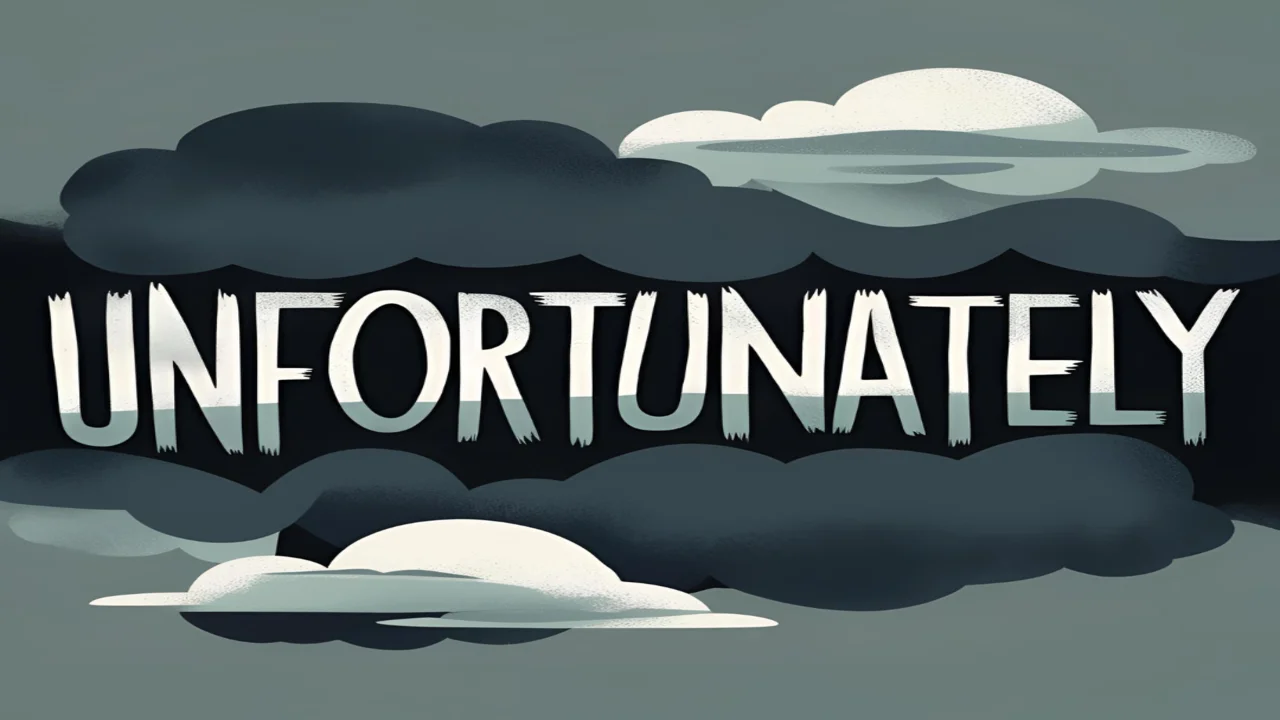Disappointment, remorse, and acceptance of less-than-ideal circumstances are all encapsulated by the nuanced meaning of the word “unfortunately” in language. Because of how it helps people cope with bad news, it is a crucial language tool for showing compassion and understanding. “Unfortunately” is a great way to express harsh realities while still being sympathetic, whether you’re talking to someone casually or writing something formal. Explored in this article are the many facets of this word, as well as its uses and importance in both formal and informal settings.
Understanding the Essence of “Unfortunately”
The basic meaning of the adverb “unfortunately” is to prepare the audience for bad news or undesirable results. Originating from the word “fortunately,” it is given the prefix “un-” to indicate situations characterized by letdown or remorse. By highlighting the inevitable or uncontrollable nature of a situation, speakers and writers can use this rhetorical device to make their message more palatable.
The Role of “Unfortunately” in Language
Acknowledging Adverse Situations
To introduce statements that describe unfavorable circumstances, “unfortunately” is the main verb. In other words, “Unfortunately, the event was canceled due to unforeseen weather conditions.” This usage shows understanding while recognizing the truth, making sure the audience is part of the feeling.
Expressing Regret and Empathy
Saying something like, “Unfortunately, I won’t be able to attend the meeting,” using this word helps convey sincere regret. Through highlighting common disappointment, this establishes a bond between the speaker and the listener.
Providing Context for Unfavorable Outcomes
The word “unfortunately” provides a clear framework for bad news in narratives and reports; for example, “Unfortunately, the team’s efforts fell short in the final moments of the game.”
Softening Criticism or Negative Feedback
Using “unfortunately” in a professional context can make criticism seem less harsh. A less aggressive way to say “unfortunately, the project didn’t meet the expected standards” would be better than just being blunt.
Encouraging Constructive Conversations
“Unfortunately” opens the way for productive conversations by tactfully admitting defeat. Instead of being defensive, it sets a tone that promotes understanding and teamwork.
How “Unfortunately” Shapes Communication
Creating Empathy in Professional Settings
“Unfortunately” is a strategic tool for staying professional when addressing challenges in business communication. In meetings, emails, and reports, it helps to strike a balance between being honest and being tactful.
Building Emotional Connections in Personal Interactions
The use of “unfortunately” in casual speech creates an emotional resonance and gives the impression of thoughtfulness. The expression “unfortunately, we’ll need to reschedule our dinner plans” conveys a mix of sadness and concern.
Setting the Tone for Diplomacy
Use “unfortunately” to keep your tone neutral and non-combative when addressing disputes or conflicts. This works wonders in mediations and negotiations.
Enhancing Narrative Impact
“Unfortunately” sets the stage for a dramatic pause in storytelling, drawing the audience in for an unexpected turn of events. As an illustration, “Unfortunately, what seemed like a promising venture turned into a major challenge.”
Driving Reader Engagement in Writing
Because stories involving conflict and their resolution tend to attract readers, authors frequently use the word “unfortunately” to pique their interest or make them feel something.
Applications of “Unfortunately” in Different Contexts
Journalism and Reporting
“Unfortunately” is a sympathetic way to introduce bad news in news articles. As an illustration, “Unfortunately, the rescue mission faced significant delays due to harsh weather conditions.”
Academic Writing
“Unfortunately” is used to denote research limitations or gaps in academic papers. For example, “Unfortunately, the study’s sample size was too small to draw definitive conclusions.”
Legal and Official Documents
“Unfortunately, the case could not proceed due to insufficient evidence.” is an example of a legal setting that uses “unfortunately” to acknowledge setbacks without assigning blame.
Creative Writing
Words like “unfortunately” help writers give their characters and stories more nuance, which in turn makes readers more invested. In other words, “Unfortunately, her dreams of becoming a dancer were shattered by an unexpected injury.”
Customer Communication
“Unfortunately, the product you requested is currently out of stock.” This sentence demonstrates how “unfortunately” is used to politely address issues and convey an apology in customer service.
Exploring Synonyms and Variants
“Regrettably” as an Alternative
Like “unfortunately,” “Regrettably” is frequently employed in more formal settings. Remorse, whether individual or communal, is emphasized.
“Sad to Say” in Conversational Tone
For less formal settings, this expression is a good substitute.
“Unluckily” for Circumstantial Context
When tragedies occur as a result of random or uncontrollable circumstances, the word “unluckily” is used to indicate this.
“Disappointingly” for Explicit Disappointment
When expectations are not satisfied, this version emphasizes disappointment.
Crafting Effective Communication Using “Unfortunately”

Balancing Transparency and Tact
“Unfortunately” is a great way to be honest without being overly harsh, which is an important quality to have in any relationship, work or otherwise.
Avoiding Overuse for Impact
Although it works, the word “unfortunately” can be overused and weaken its effect. Its ability to evoke strong emotions is guaranteed by its strategic placement.
Pairing “Unfortunately” with Positive Solutions
Example: “Unfortunately, this option isn’t available, but here are some alternatives.” This combination of “unfortunately” and constructive suggestions creates a more proactive tone.
Incorporating Emotional Intelligence
One way to strengthen connections and build trust is to use “unfortunately” thoughtfully while understanding the audience’s perspective.
“Unfortunately” and Its Storytelling Power
Creating Suspense and Drama
“Unfortunately” is a powerful tool for writers and speakers to build suspense and make their stories stand out.
Fostering Relatability Through Adversity
By drawing attention to difficulties, “unfortunately” enriches stories and makes people and events more believable.
Guiding the Audience’s Emotional Journey
“Unfortunately” sets the stage for impending doom, drawing the audience into the story’s gripping emotional arc.
Additional Insights on “Unfortunately”
Linguistic Evolution of “Unfortunately”
Latin “un-” means “negation” and “fortuna” means “luck” or “fortune,” thus the origin of the English word “unfortunately” in English. Its development mirrors the human need for sophisticated expressions of sadness or dissatisfaction.
Linguistic and psychological research suggests that using the word “unfortunately” in communication might mitigate the impact of negative news on the listener’s emotions. Particularly in delicate circumstances, this aids in reducing conflict and increasing understanding.
Strategic Use in Marketing and Public Relations
Marketing professionals often use the word “unfortunately” to address customer concerns in a way that keeps them loyal to the brand. In other words, “Unfortunately, the product launch has been delayed, but we’re working tirelessly to ensure the highest quality for our customers.”
Global Perspectives on “Unfortunately”
The word “unfortunately” has a variety of culturally specific meanings depending on language and social mores. As an example, there may not be a direct translation available in all languages, necessitating the use of other expressions to express the same meaning.
Role of Technology in Shaping Usage
“Unfortunately” has grown ubiquitous in modern electronic correspondence, appearing in virtually every message sent via email, text, or social media post. Its use exemplifies how language has evolved to meet the demands of contemporary discourse.
Your Best Year Yet: How to Plan for Success in 2025
FAQs
Can “unfortunately” be overused in writing?
Yes, overuse can diminish its impact. Use it sparingly to maintain its effectiveness.
What tone does “unfortunately” convey?
It conveys a tone of regret, empathy, or acknowledgment of negative circumstances.
Is “unfortunately” always necessary?
Not always. Consider the context and whether alternative phrasing might better suit the message.
Can “unfortunately” sound insincere?
It might, if used excessively or inappropriately. Genuine intent and context are key.
How can I avoid using “unfortunately” repeatedly?
Employ synonyms or restructure sentences to vary tone and maintain engagement.
Also Read: Your Best Year Yet: How to Plan for Success in 2025
Conclusion
“Unfortunately” is more than just an adverb; it’s a potent word that connects honesty and empathy. Its strategic application in narrative, business, and communication settings guarantees understanding and rapport while mitigating the effect of bad news. Speakers and writers can tap into its power to connect with audiences, create trust, and build rapport by mastering its subtleties and using it with care.

Doris Pollard, a mesmerizing wordsmith and experienced blogger, crafts narratives that carry readers into unexplored realms. Infused with insightful perspectives and vibrant storytelling, Doris’s mastery of language captivates both hearts and minds, making an enduring impression on the literary landscape.

